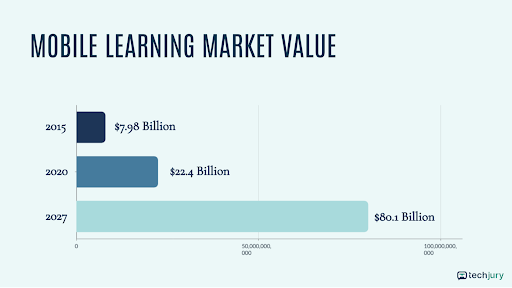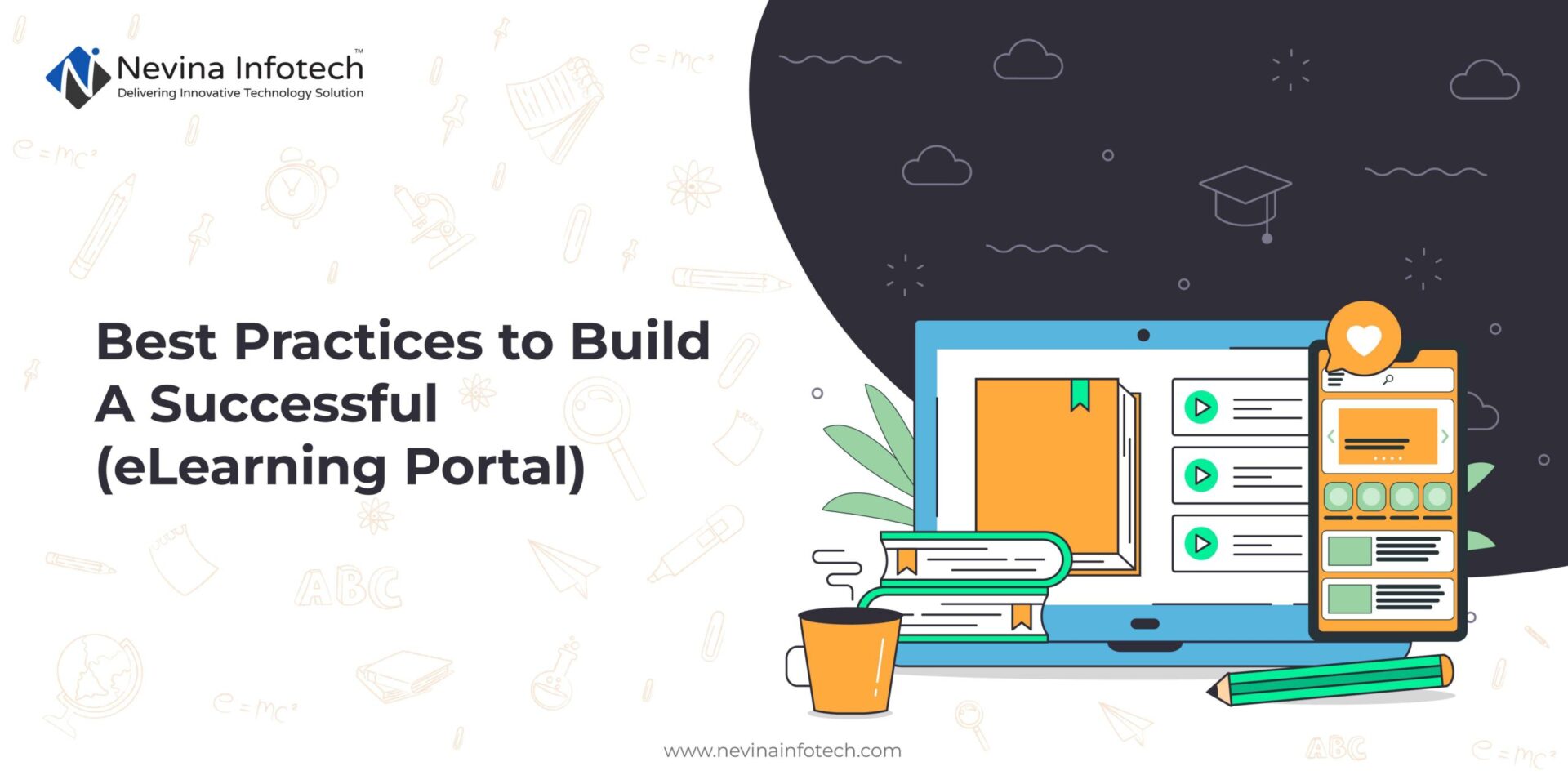Digital technologies have profoundly transformed modern education and training, especially given the recent surge in remote work. This shift has opened up opportunities for acquiring vital skills and enhancing one’s knowledge and has also heightened the importance of digital learning within the business landscape. Let’s delve into how e-learning portals systematically nurture knowledge and learning requirements with a structured and focused approach.
Did you know the eLearning market is projected to reach a staggering $1 trillion by 2028? Keep reading!
In today’s educational landscape, there has been a radical shift in the teaching and learning process, with digital education becoming readily accessible to knowledge seekers worldwide. The ability to access learning resources on-demand has ushered in a more intelligent approach to skill development, allowing individuals to stay relevant in an economy that is constantly and dramatically changing.
This remarkable growth can be attributed to the ever-expanding array of technology-driven learning options, which are evolving year after year, effectively shaping and streamlining education for a wide range of learners and their ongoing skill development needs.
The Evolution & the History of the eLearning Portal

The term e-learning has come into existence since 1995. The term can also be depicted as “virtual learning” or “online learning.” This eLearning portal assists people, students, entrepreneurs, and many people in learning from this beneficial platform. Digital technologies have evolved modern education training and have come forward with hard work and rigorous devotion to technology. The recurring chances to learn beneficial skills, boost knowledge, and enhance professional work geared up the sensitivity of learning practices by eLearning platforms.
The system of former education enraged the present need for online education platforms. So, let’s buckle up to witness the numerous ways the eLearning portal offers benefits to learners and organizations and reshaping the future of education.
What is an eLearning Portal?
Let us first understand the meaning of eLearning
eLearning, or electronic learning, is how to learn and practice through smart gadgets and electronic resources. It can be exercised through mobile computers, laptops, tablets, smart TVs, etc., provided the electronic gadgets are connected to the internet browser.
In simpler terms, the e-learning portal facilitates the implementation of effective and coherent Learning and Development (L&D) strategies, offering consistent opportunities for skill development and seamless accessibility. This approach enhances education by making it up to 20 times more engaging and impactful. At the enterprise level, eLearning presents many opportunities for upskilling and refining knowledge bases to deliver superior customer service.
Now eLearning portal is a platform that makes accessibility easy and flexible to the users, which helps them to learn, enjoy collab, and become a learned person without restricting the user to one platform.
ATD states eLearning is a structured educational course or learning experience delivered electronically. It encompasses various components, including live or pre-recorded lectures, videos, quizzes, simulations, games, activities, and other interactive elements, and may also include performance support content.
What Does an Online Education Platform Include?
Online Education platforms offer flexibility and affordability for acquiring new skills. They allow self-paced, on-demand learning, enhancing the reusability of training modules compared to traditional methods. These portals usually include a learning management system, managing content, enrollments, and learner progress. Users can access multimedia resources, quizzes, discussions, and submit assignments. Such learning portals serve diverse learners—students, professionals, and lifelong learners—providing a wide array of subjects and skills for acquisition and improvement.
Benefits of the eLearning Portal for Learners
Mentioned below are the six benefits of using e-learning portals for your education and learning.
Flexibility:
It allows the facility of enjoying eLearning easily and helps one to get a better knowledge about themselves and the innumerable content of which they are curious. People with disabilities can easily access it by just sitting at their home. Education app development company mainly focuses on offering flexible options of learning to its consumers.
Wide variety of courses:
It provides numerous online learning sites and different browsers developed by using different elearning app development services. Such as:
- Youtube
- Udemy
- Dictionary world
- Unacademy
- Coursera
- Khan Academy
Personalized Education:
One enjoys personal and attentive learning through these online learning portals.
Focussed process of learning:
It enhances the ideas and makes one more concentrative towards learning or grabbing knowledge.
Easily Reachable and Adaptable:
Everything becomes feasible once connected to the internet.
Facilitates learning anywhere and everywhere:
All eLearning portals provide information or knowledge through online platforms, which we can use at any time of our comfort zone. It is cost-friendly as well as effective to be relied upon because of education mobile app development.
Benefits for Organization
An eLearning portal built with best practices not only benefits learners but the organization, too. companies get several benefits by investing in education app development.
- High scalability– an organization can scale up the number of users it wants to serve.
- High ROI– Companies have witnessed 80% ROI in the first year and 350% in the third year. But it depends on your business and strategies.
- Monetization options– The platform serves as an income source with advertising, in-app purchases, and subscriptions.
How Much It Cost To Create An E-Learning App with Latest Features
What are the Key Features of eLearning Platform?
As previously detailed, an eLearning portal is a digital platform serving as a central hub for online education and training. It grants learners access to curated educational content, courses, and interactive resources, catering to diverse learning needs and optimizing knowledge acquisition and retention. Below are some typical features that empower e-learning portals to enhance the educational experience and increase user engagement rates.
Personalization for better engagement
Personalization is the foremost feature of any online educational platform, aimed at achieving the highest relevance and optimal engagement. A learning portal with hyper-personalization leverages learner data, including educational preferences and browsing history, along with AI algorithms to provide a tailored educational experience. This approach customizes content, learning journeys, and assessments to align with individual learning needs, interests, skills, and proficiency levels.
Learners benefit from educational app development that offers personalized course suggestions, fostering engagement with pertinent and challenging materials and boosting motivation for acquiring new skills and retaining knowledge.
Different models and formats for dynamic learning
Maximizing skill development and knowledge retention hinges on offering educational content in diverse learning formats. These formats of mobile e-learning app may include tutorial videos, text-based courses, interactive simulations, quizzes, and gamified modules catering to different learning styles and preferences.
Any educational software development project should prioritize incorporating multiple learning formats into its core features. This approach keeps learners engaged, offers varied avenues for effective information absorption, enriches the learning experience, and promotes inclusivity. Ultimately, this empowers the eLearning portal to achieve optimal engagement and a higher success rate in learning outcomes.
Compatibility with multiple devices
When developing an educational app, prioritizing multi-device compatibility is crucial to enhance contemporary education and remote learning accessibility across a wider audience. This feature empowers learners to adapt their knowledge acquisition to their time and needs conveniently and effectively. Mobile apps development needs to be compatible to smart phones.
Online Educational platforms’ capability to seamlessly deliver learning content and virtual training on smartphones, tablets, laptops, and desktops offers flexibility and convenience. Learners can study at their own pace, with the ability to switch devices without losing course progress, facilitating continuous learning in diverse educational settings. This accommodates busy schedules and lifestyles, doubling engagement and enhancing the learning experience, ultimately helping learners stay competitive.
Real insights, data, and analytics for an advanced educational journey
Making it twice as easy and effective to manage and improve a student’s educational journey is possible when we have real-time insights into their progress, course engagement, completion rates, and overall satisfaction. By visualizing data on how students engage and develop their skills, we can pinpoint areas that need improvement and offer personalized support and interventions. This approach ensures that each learner’s knowledge map is fine-tuned to maximize results, all guided by advanced learning analytics reports derived from their activity on the EdTech platform.
Wider learning options with a detailed content catalog
Educational experiences within EdTech platforms must prioritize user-centered customization for enhanced convenience and relevance. This entails designing skill development modules that address each individual’s critical learning gaps while helping them discover new upskilling opportunities aligned with their educational objectives and interests.
Mobile apps development company always adds a content catalog that typically encompasses courses categorized by subject and difficulty level, from beginner to advanced options. This categorization simplifies the process for learners, allowing them to easily explore and select their preferred learning paths.
Integrated social learning systems
Incorporating social learning elements like discussion forums, chat functionalities, and group activities creates a collaborative learning environment, encouraging interaction and knowledge-sharing among learners. This facilitates the exchange of ideas and significantly enhances skill development, leading to a twofold increase in outcomes. for the integration process, you can hire app developer in India. ELearning platforms that nurture a supportive learning community and offer robust peer-to-peer educational programs yield an impressive 80% higher return on investment.
Certification for learners
In online learning, it’s crucial to demonstrate your skills and educational achievements. When you complete a course or reach a specific learning milestone on online training platforms, they reward you with a certificate. These certificates officially recognize your accomplishments, signifying your expertise in a particular subject or ability to perform a specific skill. They are like awards that validate your knowledge and competence.
But these certificates are more than just pieces of paper or digital badges; they also play a motivational role. They encourage learners to stay committed to their educational journey and continue working on their skills and knowledge. They are tangible proof of your dedication and can be valuable when seeking new opportunities in your field or showcasing your expertise to others. So, in the digital learning landscape, these certificates are both a testament to your achievements and a driving force for your continued growth and development.
Customized learning portfolio
Personal learning portfolios represent personalized collections of a learner’s educational achievements, ongoing progress in learning modules, and reflections on past educational experiences. They serve as comprehensive records of a learner’s journey and accomplishments, encompassing both formal and informal learning experiences. These individual portfolios allow learners to review completed projects, assignments, and achievements, acting as digital showcases of their skills and knowledge while facilitating the identification of areas for improvement.
An online learning portal that incorporates these key features provides an engaging, personalized, and efficient learning experience. It empowers learners to take charge of their education, access content in various formats, and connect with a supportive community, ultimately leading to improved educational outcomes.
These features collectively cultivate a user-friendly and interactive learning environment, making eLearning portals a potent tool for education and skill development in the digital age.
Power Of AR And VR In Education
Best Practices for Building a Successful eLearning Portal
A learning portal offers many advantages, such as instant access to various educational resources at different levels. It promotes outcome-based learning, increasing knowledge retention potential by up to tenfold, and accelerates upskilling capabilities by 60%. Having explored the features and benefits of an e-learning portal, it’s now essential to delve into best practices for online portal development to achieve optimal results.
A responsive and user-centric design
Create a user-friendly interface for learners with easy navigation, clear instructions, and a nice design that works well on all devices. This way, learners can access their courses smoothly, no matter their device. To build an interactive user interface for Androids you need to hire Android app developers offering quality services.
Engaging content authoring system
Educational app development needs a content-authoring system. Develop and adjust educational content on the fly with a user-friendly and dynamic content authoring system. This system includes customizable course templates, a content editor for learning materials, modules for segmenting content, and the ability to add user-generated content. Trainers and administrators can easily update course content, assessments, and multimedia components without the need for complicated coding or technical skills.
Take advantage of powerful accessibility modules
Ensure the online education platform is user-friendly for all, including those with disabilities. Follow accessibility standards like WCAG (Web Content Accessibility Guidelines) and incorporate features like screen reader compatibility, keyboard navigation, alt text for images, and other tools for assistive technologies.
Use third-party integrations for optimization
Linking the eLearning software with external tools and services, like a complete LMS training portal, content authoring tools, analytics platforms, and video conferencing apps improves system performance and adds features more efficiently and affordably. These third-party modules streamline content management and data analysis, boosting the overall functionality and efficiency of the e-learning portal login platform and creating a robust learning environment. Here are the software that can be integrated –
- HR software is utilized to provide tailored corporate training by analyzing employee HR data, including roles, responsibilities, skills, and work experience.
- The Learning Management System (LMS) enhances the portal’s learning content delivery with features like event scheduling and training activity tracking.
- Social media software fosters social and collaborative learning, allowing learners to share their achievements, such as completing a course or earning a certificate, on social media platforms.
Ensure high-security and robust administration
Implement robust security measures to safeguard user data, including encryption, authentication, and authorization. Utilize role-based access control to limit user permissions based on their roles. Adhere to applicable data privacy regulations and keep security protocols up to date to shield user data and thwart unauthorized access. for security measures in Androids, you need an Android app developer for hire.
Use data management with cloud
Enhance the security and efficiency of learner data by utilizing cloud-based storage, processing, and accessibility. Leveraging cloud technology provides a smoother, more adaptable system for managing educational data. It encourages global collaboration and enhances distance learning experiences. Strengthen your online training portals with the dependable and resilient cloud infrastructure that caters to the evolving demands of modern education. Elearning app development services offer the options of management with the cloud.
By implementing these best practices, you can develop a comprehensive, secure, and user-friendly eLearning portal that offers an outstanding learning experience for diverse learners while meeting the technical standards of contemporary online education platforms.
How Much Does It Cost to Develop a Mobile App
Conclusion
E-learning has already taken over the traditional education system. there exists a lot of competition and you need to build a learning platform that offers something unique and helpful. Remember, the most crucial aspect of your online learning website is delivering effective educational content. Without it, even the most advanced technologies won’t rescue you from failure.
Are you looking for someone who can help you build a successful eLearning portal? Nevina Infotech has expert developers on their team with years of experience. you can get the best online education platform for the highest ROI and growth of your organization. reach out to us and we will build a customized strategy according to your needs.
Frequently asked questions
Here are the most popular FAQs about building interactive and successful learning platforms.
What are the best features of e-learning platforms?
An e-learning platform should have
integration
tracking reports system
security
gamification
third-party integration
cloud management system
enhanced visuals
user-friendly interface
easy payment getaway
What is the objective of online education platform?
Online education platforms allow user to learn at their own pace. it takes into account their preferences and needs. also, it offers flexibility and other resources to help them learn easily.
What are the 5 benefits of e-learning portals?
e-learning platforms offer several benefits to both learners and organizations. Here are the top 5 benefits
* You can learn from anywhere and at anytime
* Your lectures are saved and you can repeat them anytime
* Organization can update content easily
* It is also cost-effective
* It has less impact on the environment.
What are the 6 different types of elearning?
Computer Assisted Instruction
Fixed eLearning
Synchronous Online Learning
Asynchronous Online Learning
Interactive Online Learning
Linear E-Learning.



